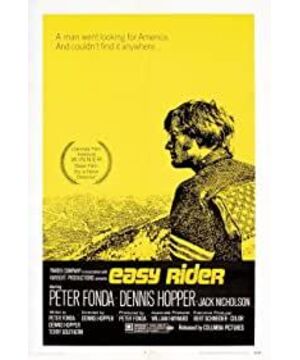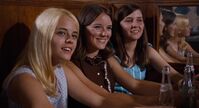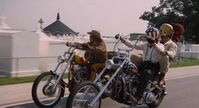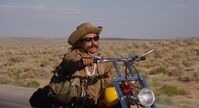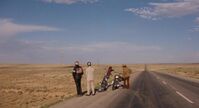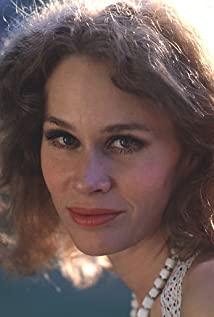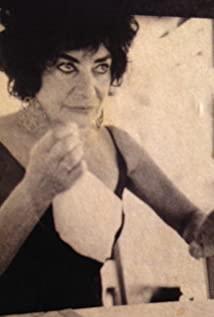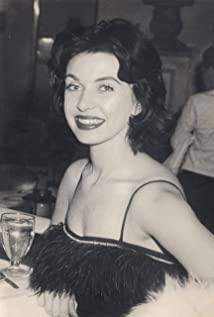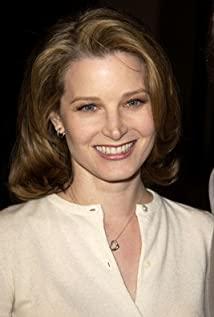Today, let us return to Hollywood in the late 1960s. Assume that as an independent filmmaker, you already have a budget of $400,000. So, with this money, how many box-office movies can you make? As a reminder, Hollywood was facing the biggest crisis in its history. In 1960, the annual output was only 151. The seven major film industries were heavily indebted and layoffs/mergers continued. By 1968, income from TV stations accounted for all of Hollywood’s income. one third. Faced with the dual threats of art exhaustion and economic stagnation, what can a mere US$400,000 do?
To be an exaggeration, multiply this number by 10 to get 4 million dollars, isn't it incredible? However, what is even more incredible is that this 4 million dollars is not even a fraction of the box office of that movie-its actual figure is 25 million dollars! ! That film is called "Easy Rider".
In 1969, "Easy Rider" turned out. This is an existential road movie full of confusion, denial, rebellion, and tragedy, just like the description of Kerouac’s "On the Road"... The people I associate with are just crazy people, they Live for madness, talk for madness, and madly seek salvation; they desire to have everything at the same time. These people never complain, they speak amazingly, they always burn, burn, burn, just like those Roman candles with blue gloomy light in the legend... In the film, two of them have long hair, fancy clothes, and drugs. The protagonist, who was wandering around on a giant motorcycle, finally went out like a blue candle. After attending a gathering of drug addicts on the cemetery, on the way to Florida, he was shot and killed inexplicably by a passing truck driver. "Easy Rider" is not only one of the classic symbols of the American Beat Movement in the 1960s, but also a watershed in the golden age of Hollywood. The success of "Easy Rider" swept Hollywood like a storm at the time. Major companies and filmmakers have invited consultants to study this phenomenon and countermeasures, and found that 48% of the audience during this period were young people aged 16-24. As a result of the investigation, Hollywood eliminated a whole generation of screenwriters, directors, and administrators almost overnight, and replaced it with a new generation of young producers, taking advantage of the contradictions between young people and the existing society to make the revolution easy to get rid of. The perfect product.
Fundamentally speaking, "Easy Rider", a low-cost film without a star (the three main characters in the film, Dennis Hope (also the director), Peter Fonda, Jack Nicholson, also They are all unknowns), are the products of the influence of B-level films in the 1960s. The director of the film won the 1969 Cannes Film Festival [Best New Director Award].
Keywords: New Age hippie generation of Hollywood musical road movie Beat
personal resolve of the film
The fundamental purpose of the survival and development of mankind, and all the material and spiritual exploration and practice of human society, is to enable us human beings to move from one stage of freedom to a new, higher stage of freedom. But what is freedom? The academic view is like Hayek said: "Freedom is the non-existence of compulsion, it is the description of the state or process of human civilization." Nonsense sayings such as: "One day you feel very lonely, very boring, very helpless, very sentimental, want to do everything but don’t bother to do everything, no one calls you or visits you, and you don’t want to talk to anyone. Contact... Then congratulations, you are free."
Bob Dylan sang in his famous rock song "The Answer Is Gone in the Wind": "How long can a mountain exist, how many years can people survive before it is washed into the sea, before he is free". The yearning and exploration of freedom is also the ultimate goal of all art forms. The Beatles, Elvis Presley, Picasso, Dali, Kerouac, Ginsberg, Foucault, Cui Jian... Such a list can also be listed A large pile. In the movie, "Wild Rider", "Four Hundred Strikes", "Fight Club", "My Heart is Wild", etc. all ask our hearts: freedom, where are you?
In 1969, I remember that the best Oscar film of that year (awarded in 1970) was "Midnight Cowboy", but if it is the influence on the film industry of later generations, I have to mention the starring Dennis Hope and Peter Fonda. "Easy Rider". This film about the life of hippies in the United States in the 1960s is the ancestor of Hollywood "road films". It not only influenced a large number of film directors such as Wim Wenders, but also guided the hearts and minds of countless young people struggling in perplexity. After the film was released, the most famous prop in the film, the Harley motorcycle, gained fame and attracted the attention of avant-garde youths all over the world.
Our "Easy Riders" are two cool-dressed hippies, with stray hair, weird costumes, and shiny high-handled motorcycles. The two "Easy Riders" of White and Billy use this image in the "Looking for The song of "America" traversed the unexplored wilderness in the south, and embarked on a long march against suppression and pursuit of freedom. They are drug dealers and philosophers who talk about freedom and aliens under the stars at night; they are prostitutes and the innocent young people who are popular in the "free commune"; they are kind-hearted "false monks" "It is also a "social scum" that is disgusted and criticized by people...This is the United States in the 1960s. War and fraternity coexist, illusion and reality contradict each other, and the spirit and material are in an endless game.
The whole film is a road trip between White and Billy. There is no purpose and no direction. It reminds me of Kerouac’s famous novel "On the Road", and it reminds me of Cui Jian in "The Fake Monk" Lyrics in: "I want to walk from south to north, and from white to black. I want people to see me, but I don't know who I am". The film begins with a drug deal. The two make a fortune, hide the money in the fuel tank of the motorcycle and embark on the journey. The director did not explain their profession, family, and everything about their background. The scenery on the road is the evidence to prove their existence, and "going on the road" is their only purpose and meaning. Half of the film is filming the "road conditions" and scenery along the way, and is covered with moving country music and rock music. In short, this movie has enough roads, enough rock and roll, enough country, enough confusion, enough collapse... In
the first half of the film, the two people said that the purpose was to go to New Orleans to participate in the "April Fast". The parade, but after arriving, he was somehow caught in jail, but fortunately, a lawyer played by Jack Nicholson came to his rescue. This is also a cynical lord. He doesn't do a good job with a face, but wants to be a hippie with our protagonist. Later, he was beaten to death by someone from a small town in the dark. At this point, the two probably also felt that life is impermanent, so they took the money left by the lawyer and went to prostitutes together, and took the girls to the cemetery to take drugs and fool around. . When the two were on the road again, they were greeted with unprovoked death: a truck driver who saw them unpleasantly fired a shot on each of them, and the film ended with the singing of "Looking for America".
Why did White and Billy "on the road"? Are they angry youths or hermits? Milosh asked, "What to call, and who to call?" and said: "The Almighty God blindly crosses the woolly haze horizon, toward the unreachable valley that is always covered by words. , The two of us knelt naked there, being purified by a imaginary spring..." It seems that the Almighty God is still blind, not to mention us ordinary people. The reason described in Jack Kerouac's "On the Road" is relatively simple: I only like this type of people, their lives are wild and unruly, they speak passionately, are very demanding of life, and want to have everything. They are dismissive of ordinary things, but they are eager to burn, burning like the giant yellow Roman candle in mythology, eager to explode, and emitting blue light in the explosion sound like a planet impact, which is amazing.
There is an impressive late-night dialogue in the film. The lawyer said: "This country used to be a good country. I don't understand what went wrong." Billy said, "Everyone has chickens. That's it, we can't even get into a second-rate hotel." The lawyer went on to say: "They are not afraid of you, but what you represent." Billy is puzzled: "What we represent is that everyone needs a unique hairstyle." The lawyer said: "No, you represent freedom..." Freedom, this is the crux. The lawyer said: "Talking about it and realizing it are two different things. Real freedom is very difficult, especially when you are bought and sold in the market. So don't tell people that you are not free. They will kill and do evil. Prove that you are wrong"...I am sorry to quote this long conversation, but they are really wonderful. The three people talked about this passage under the urge of marijuana, and we need to be able to understand it when we are in a illusion. It's just that this was the last time the lawyer talked, and a few hours later he died unclearly.
People once again used killing and doing evil to declare that we were wrong. The awake people die by fate, while the faint people always have the right to speak. They use false moral judgments to drive us to ruin again and again, so we have no choice, we are always "on the road." This is the answer. In addition to lawyers in the film, there are also a large number of false fugitives who evade the world-at the same time, they are the bravest explorers-this is the most vivid portrayal of the Western "hippie movement" in the 1960s. The 1960s was the most profound and serious historical period in the United States since World War II. It originated from the great abundance of material life and the lack of traditional beliefs. At that time, the confusion of young people and their increasing sense of social responsibility had a fierce collision. Under the catalysis of rock music, young people began to merge in this contradiction, and finally formed the most representative cultural phenomenon of that era. A completely spontaneous and purely spiritual movement: hippie movement.
In order to avoid the "unfavorable situation" in the real world, hippies usually flee to the wilderness in order to enjoy the "pleasure" brought by nature, "deeply" observe life and enjoy "free love". The gathering place of these hippies is called the "community." A "community" is a community where people share wealth, shelter, and work together (or no labor at all). The places where they live are often just simple houses or tents, where they will "live in" after a day of hard farming. In the film, the director (that is, the person who plays Billy the Beard) paints this scene with a lot of space. The building here is dressed like a theater, full of "installation art" and the stars and stripes of the United States. Children are playing freely, and adults are all happy comedians. From time to time, they sow seeds on the barren land, longing for the simplest diet. The director used a panning camera to show the "brilliant images" of more than 20 hippies in turn, most of them with deep eyes and bears like Marx and Castro. They are not only philosophers full of ethics, but also recluses who escape the world.
The great thing about "Easy Rider" is that besides it represents road movies, hippie movies and rock movies, it is also the first movie that strongly stimulates our nerves with drug shots. In the 1960s, the relationship between hippie, rock and cannabis was as close as a brother. Just like in Oliver Stone's movie "The Gate", when the Gate Band was performing, the marijuana cigarettes thrown by the audience almost buried their feet!
Conclusion:
It is said that the appearance of "Easy Rider" is like the Monkey King in "Journey to the West" popping out of the stone in the silence of the world. By coincidence, this rebellious monkey is also suitable for the so-called "Beat Generation". , The purpose of "hippies", always rebelling against tradition is victory. The only shortcoming is that they do not have the ability of Monkey King to go to the earth, which has led to some "negative pessimistic" labels branded on them: depression, confusion, depravity, and self-destruction. . . All kinds of. They are fighting backwards, traveling or indulging in poison, rock and roll or bizarre death.
What is freedom? Freedom is the possibility of dying on the road at any time. In the last part of the film, they were ridiculously showing their deaths. One person in the truck tried a gun and killed one like a bird. The other was also killed when he caught up with them. The scene that was more indifferent than before "Nicholson" was killed, said all this coldly, silently.
2012.6.12
View more about Easy Rider reviews


